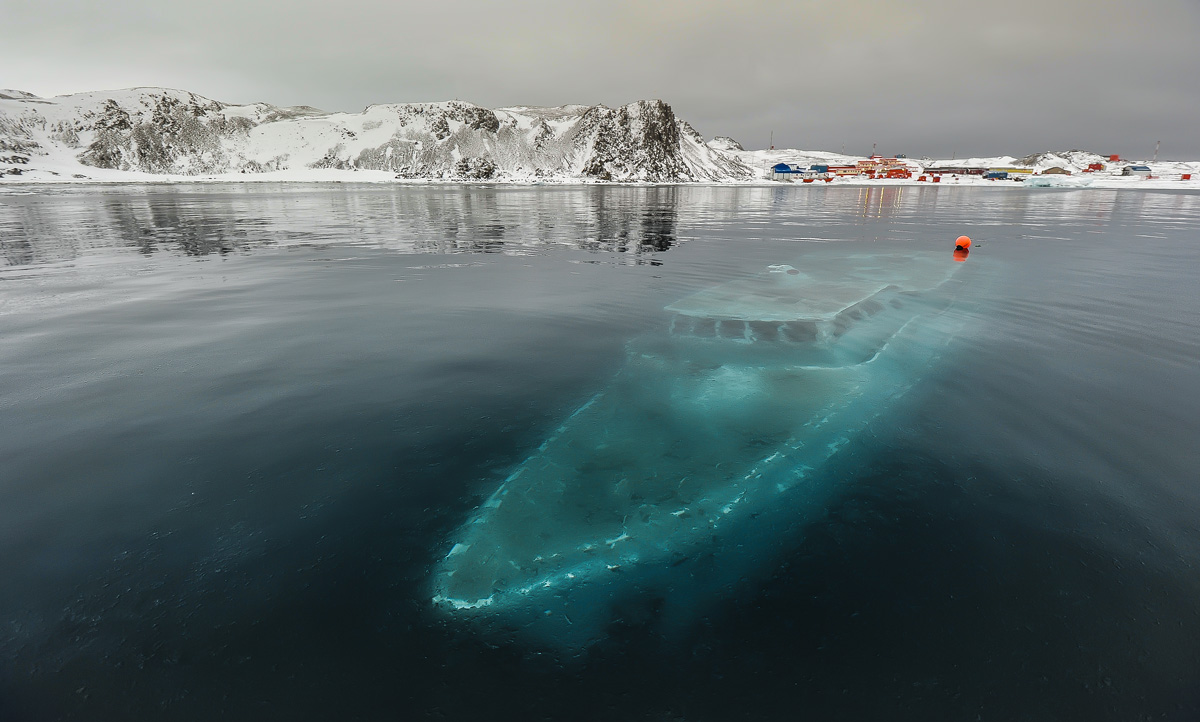
Creepy... but beautiful! The Mar Sem Fim was a yacht owned by the Brazilian journalist Joco Lara Mesquita. Four researchers were using it to film a documentary off Antarctica when the weather turned bad. High waves and 40-knot winds made the boat toss back and forth "like a bucking bronco in a rodeo". The Chilean Navy was sent to the rescue, since the closest ships were at the Chilean Antarctic base Presidente Eduardo Frei Montalva. They had to wait for the weather to calm down to save the four crew.
They did it just in time: icy water had filled the yacht. Later this water froze, expanded and split the hull! Surrounded by ice, the boat sank to the bottom of a shallow bay: Maxwell Bay of Ardley Cove, Antarctica.
Lots of people who see this photo feel uncomfortable, and that fascinates me. I think it's a metaphor of death. But in early 2013, ten months later, the yacht's owner returned to the site and rescued the Mar Sem Fim! Divers wrapped strong lines under the hull and attached them to inflated buoys. Once it reached the surface, they towed it back to shore. You can see photos of the whole story here:
This is the Beauty of Xiaohe, one of the mummies found in the Small River Cemetery near the eastern end of the Tarim River in the Taklamakan Desert.
This cemetery dates back to 1970 BC. It was rediscovered in 1934 AD by the Swedish archaeologist Folke Bergman... and then forgotten until a Chinese expedition found it again with the help of a GPS system. Archaeologists began excavating it in 2003.
When they dug into it, they found five layers of burials. They found almost 200 poles, each standing 4 meters tall. Many had flat blades, painted black and red, like oars. At the foot of each pole there was a boat, laid upside down and covered with cowhide. Inside the boats were bodies. Mummies!
The mummies were wearing large woolen capes with tassels and leather boots. They had felt caps with feathers tucked in the brim. And next to them were grave goods, including beautifully woven grass baskets, skillfully carved masks and bundles of ephedra, a widely used medicinal herb.
I'm summarizing a nice New York Times article; you can read the whole thing here:
For a map showing the location of the Small River Cemetery, go
here.
I've been talking a lot about Silk Road towns in the Taklamakan
Desert, their history and architecture. But this desert might also
play an important role in the world's weather! Check out this amazing
Sudden
Stratospheric Warming event. See where it starts? For more, read
this:
These events are not rare. They're so dramatic that at first
scientists thought they were caused by volcanic eruptions! They're
still mysterious.
The Taklamakan Desert, surrounded by mountains to the north and south,
is really quite amazingly deep. You can see it nicely in this image
made by the CALIPSO satellite. There's almost a 4-kilometer drop when
you descend from the Kunlun Shan mountains into this desert... and
quite a rise to the north, too, when you hit the Tian Shan mountains.
CALIPSO
stands for Cloud-Aerosol Lidar and Infrared Pathfinder Satellite
Observations. It's a French/American project to study clouds, dust
and the like by shining a laser beam down to the Earth and measuring
the amount that gets scattered back.
This technique is called lidar. The word 'lidar' was
originally created by combining the words 'light' and 'radar'.
However, everyone tends to assume this word is an acronym. So, people
often spell it LIDAR - and then they had to come up with some words
that this could be the acronym of! Since RADAR is an acronym for
'RAdio Detection And Ranging', some people say LIDAR is an acronym for
'LIght Detection And Ranging'... or 'Laser Imaging, Detection And
Ranging'.
Hey, but nobody writes 'RADAR' in all capitals anymore: like 'laser',
it's become an ordinary word! People are so confusing.
I got the above picture from this article about how the Taklamakan
Desert may affect the world's weather:
For my May 2013 diary, go here.
© 2013 John Baez
baez@math.removethis.ucr.andthis.edu